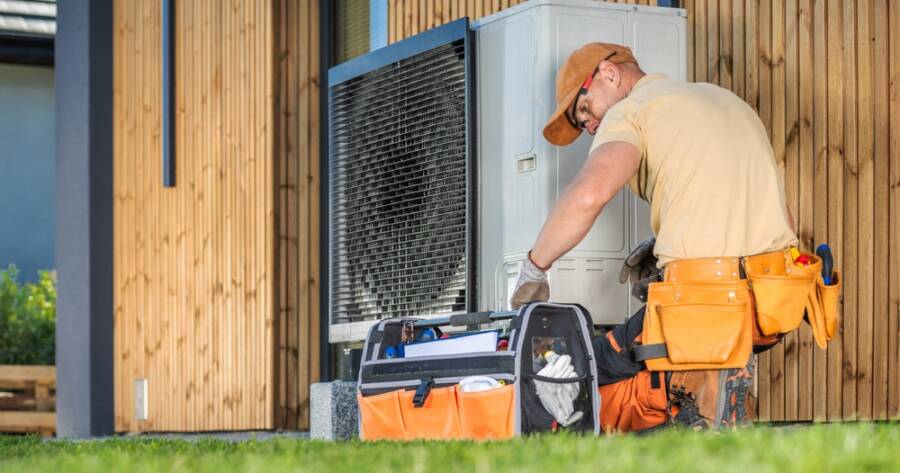A heat pump is a device that transfers heat from one place to another, providing efficient heating and cooling for homes. UK homeowners should consider the costs and benefits of heat pumps, as they can reduce energy expenses and support environmental goals.
What Is a Heat Pump?
Heat pumps are innovative devices that transfer heat from one location to another, utilizing a refrigeration cycle to provide both heating and cooling. They operate by extracting heat from the air, ground, or water and transferring it indoors during colder months, while reversing the process to expel heat outdoors in warmer months.1 This dual functionality makes heat pumps a versatile solution for climate control in residential settings. The technology has gained traction in recent years, particularly in the UK, as homeowners seek more sustainable and energy-efficient alternatives to traditional heating systems.
Recent advancements in heat pump technology have improved their efficiency and effectiveness, making them a more attractive option for homeowners. Heat pumps can achieve a higher efficiency rating compared to conventional heating systems, meaning they can produce more energy than they consume. This efficiency is particularly beneficial in the context of rising energy costs and the increasing urgency to reduce carbon footprints.
Furthermore, heat pumps are categorized into different types, including air-source, ground-source, and water-source heat pumps, each with unique advantages depending on the installation environment. The choice of heat pump can significantly impact performance and efficiency, making it essential for homeowners to consider their specific needs and circumstances when selecting a system.
How Much Should UK Homeowners Be Paying for a Heat Pump?
When considering the cost of a heat pump, UK homeowners should be aware that several factors can influence the price. The size of the property, the type of heat pump chosen (such as an air source or ground source), the complexity of the installation, and any necessary modifications to existing heating systems can all affect the overall cost.
Additionally, regional differences in labour costs and availability can play a role. Homeowners are encouraged to shop around and compare quotes from different suppliers to find the best option that fits their budget. By researching various models and consulting with certified installers, homeowners can ensure they select a heat pump that offers both efficiency and affordability, tailored to their specific needs and circumstances.
How Heat Pumps Help UK Homeowners Save on Energy Costs
Heat pumps offer substantial savings on energy costs for homeowners in the UK. By utilizing renewable energy sources, such as ambient air or ground heat, these systems can significantly reduce reliance on fossil fuels, which are often subject to volatile pricing.2 The efficiency of heat pumps means that for every unit of electricity consumed, multiple units of heat can be generated, leading to lower overall energy bills. This is particularly relevant in the current economic climate, where energy prices have seen considerable fluctuations.
Moreover, the integration of heat pumps into the home heating system can enhance property value. As energy efficiency becomes a more significant consideration for homebuyers, properties equipped with modern heat pump systems may attract higher market interest. This trend underscores the financial advantages of investing in energy-efficient technologies, as they not only reduce ongoing costs but also enhance the overall appeal of a property.
Benefits of Heat Pumps: Lower Bills, Reduced Emissions, and Incentives
The benefits of heat pumps extend beyond mere cost savings; they also play a crucial role in reducing carbon emissions. As the UK aims to transition to a low-carbon economy, heat pumps represent a key technology in achieving these environmental goals. By replacing traditional gas or oil heating systems with heat pumps, homeowners can significantly lower their carbon footprints, contributing to national efforts to combat climate change.
In addition to environmental benefits, heat pumps are often supported by government incentives designed to encourage their adoption. Programs such as the Renewable Heat Incentive (RHI) provide financial support to homeowners who install renewable heating technologies, including heat pumps.3 These incentives can significantly reduce the upfront costs associated with installation, making it more accessible for a wider range of homeowners. As awareness of these programs grows, more individuals are likely to consider heat pumps as a viable option for their heating and cooling needs.
Furthermore, heat pumps are known for their durability and low maintenance requirements, which can lead to additional savings over time. Unlike traditional heating systems that may require frequent repairs or replacements, heat pumps are designed to operate efficiently for many years with minimal intervention. This reliability, combined with the potential for lower energy bills and reduced emissions, makes heat pumps an attractive choice for homeowners looking to invest in sustainable technology.
Learn More About Heat Pumps
For those interested in exploring the advantages and functionalities of heat pumps further, numerous resources are available. Homeowners can consult government publications, industry reports, and academic studies to gain a deeper understanding of how heat pumps can benefit their specific situations. Engaging with local energy advisors or contractors who specialize in heat pump installations can also provide valuable insights and guidance tailored to individual needs. As the demand for energy-efficient solutions continues to grow, staying informed about the latest developments in heat pump technology will be essential for making informed decisions.
